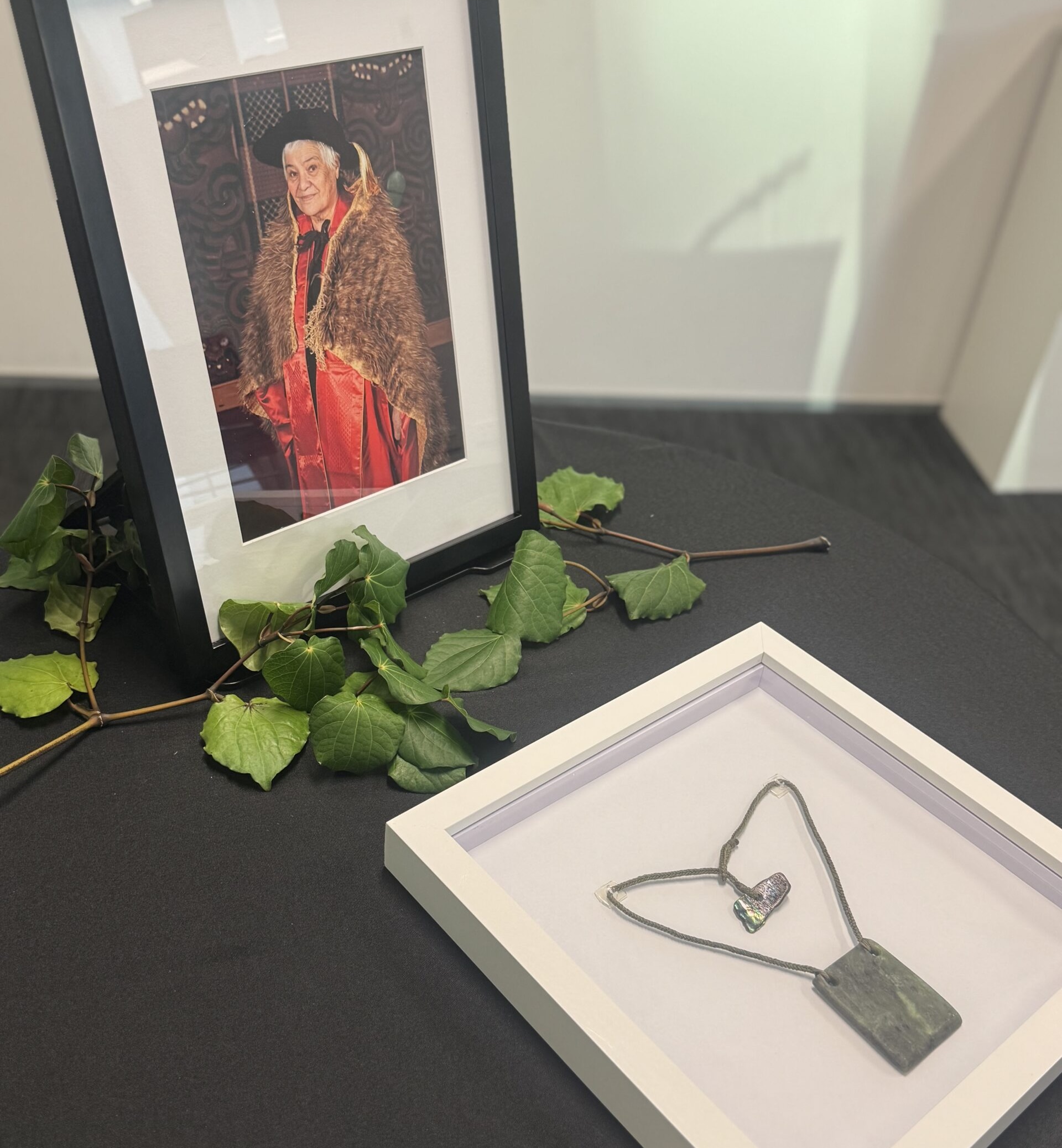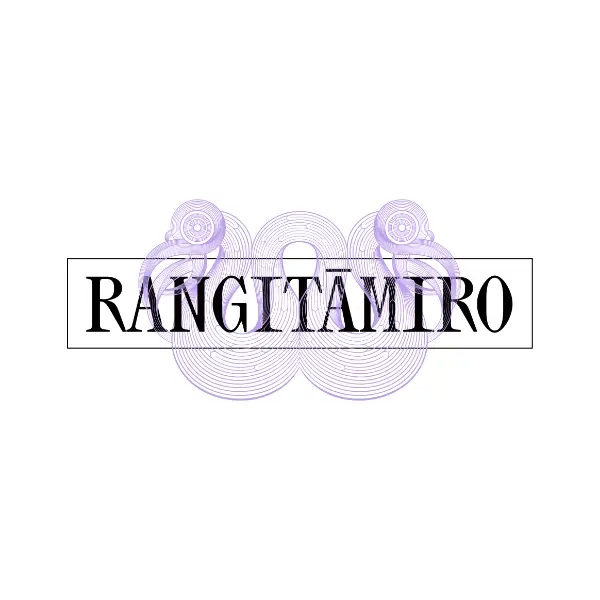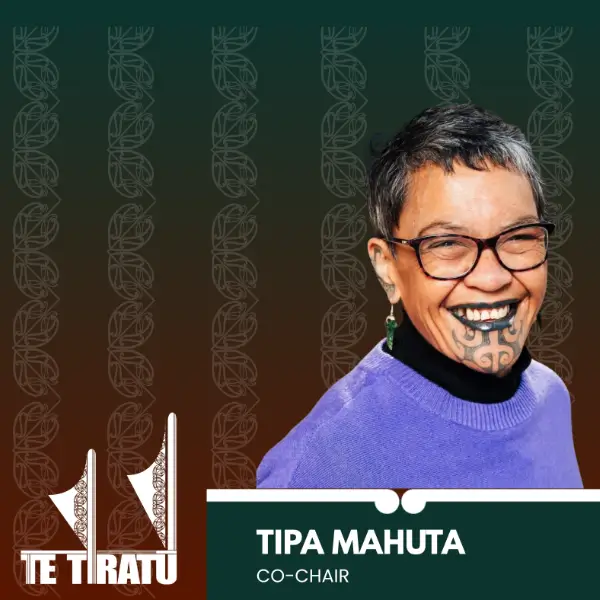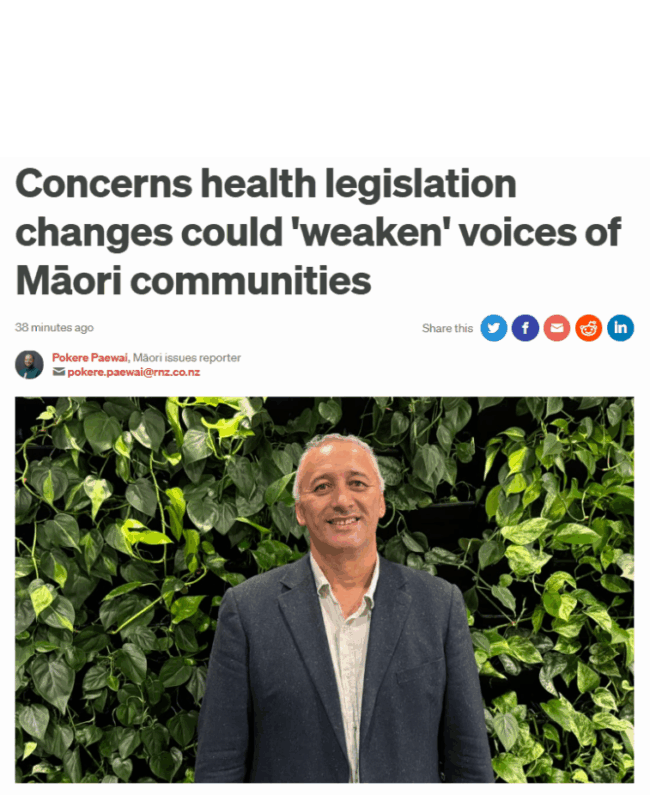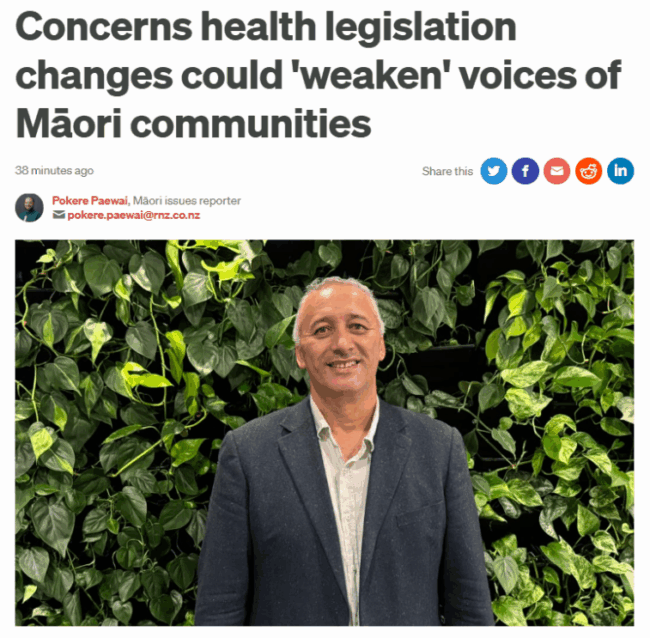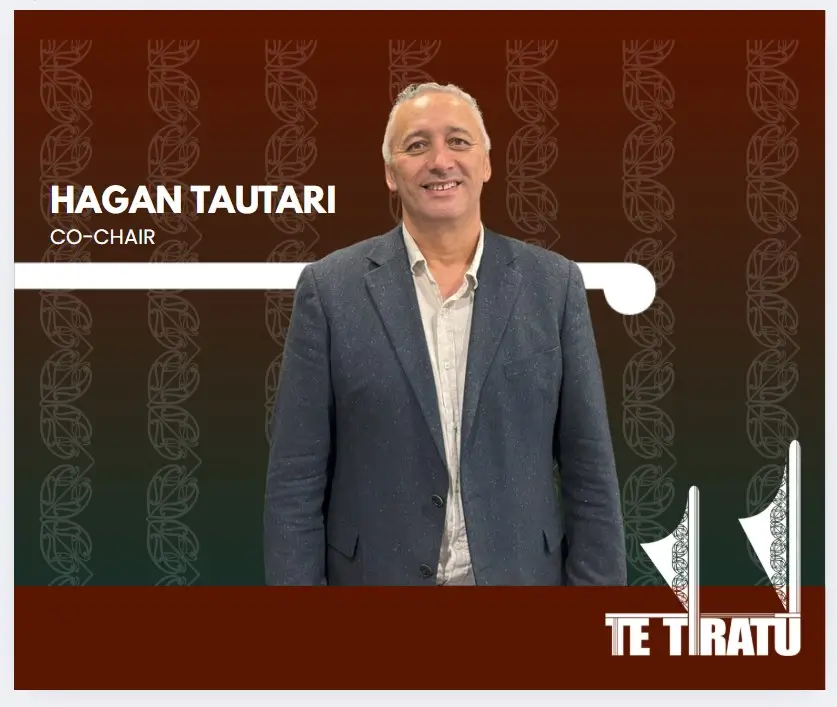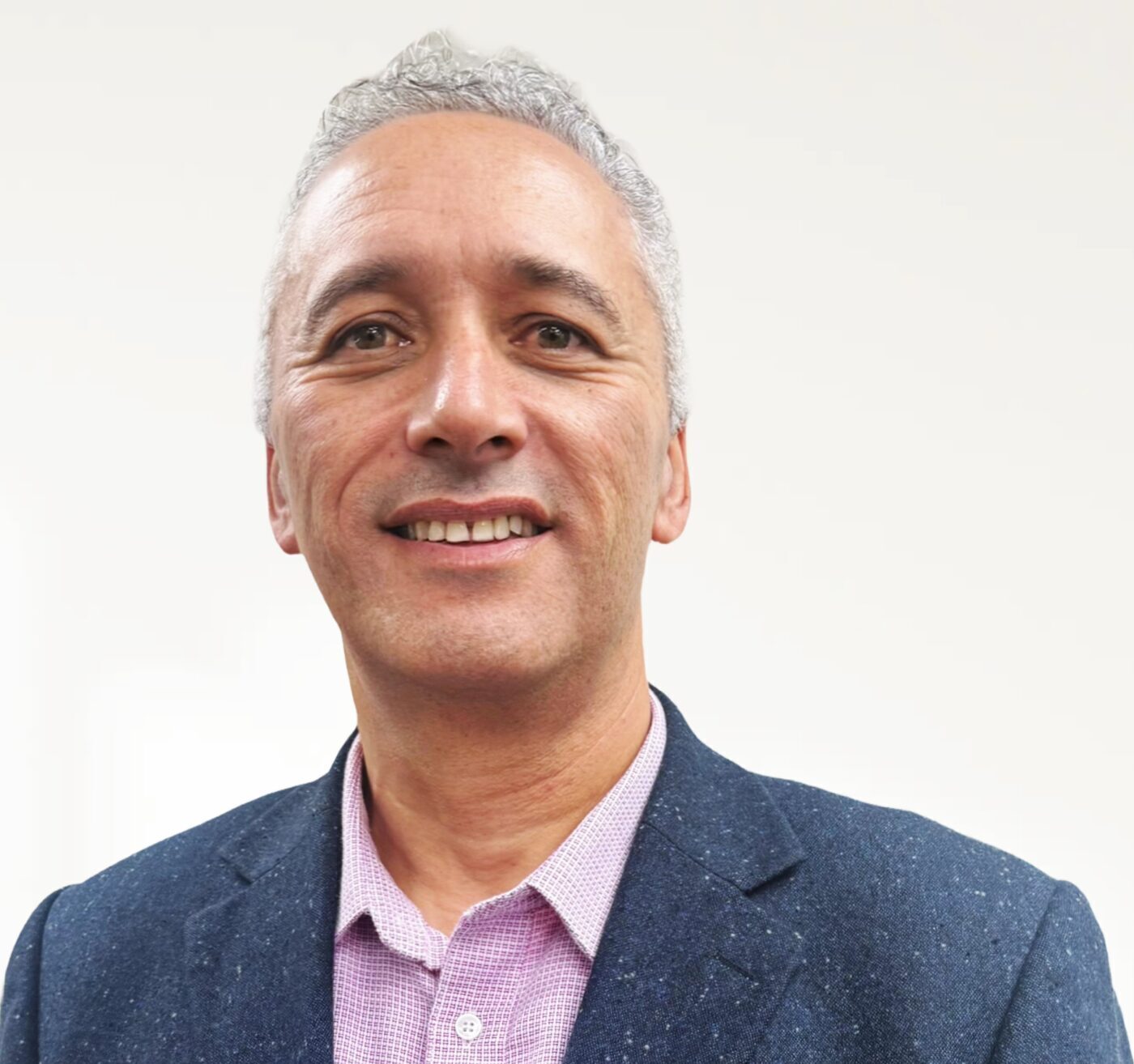From knowing to showing: Social value in focus at provider Forum
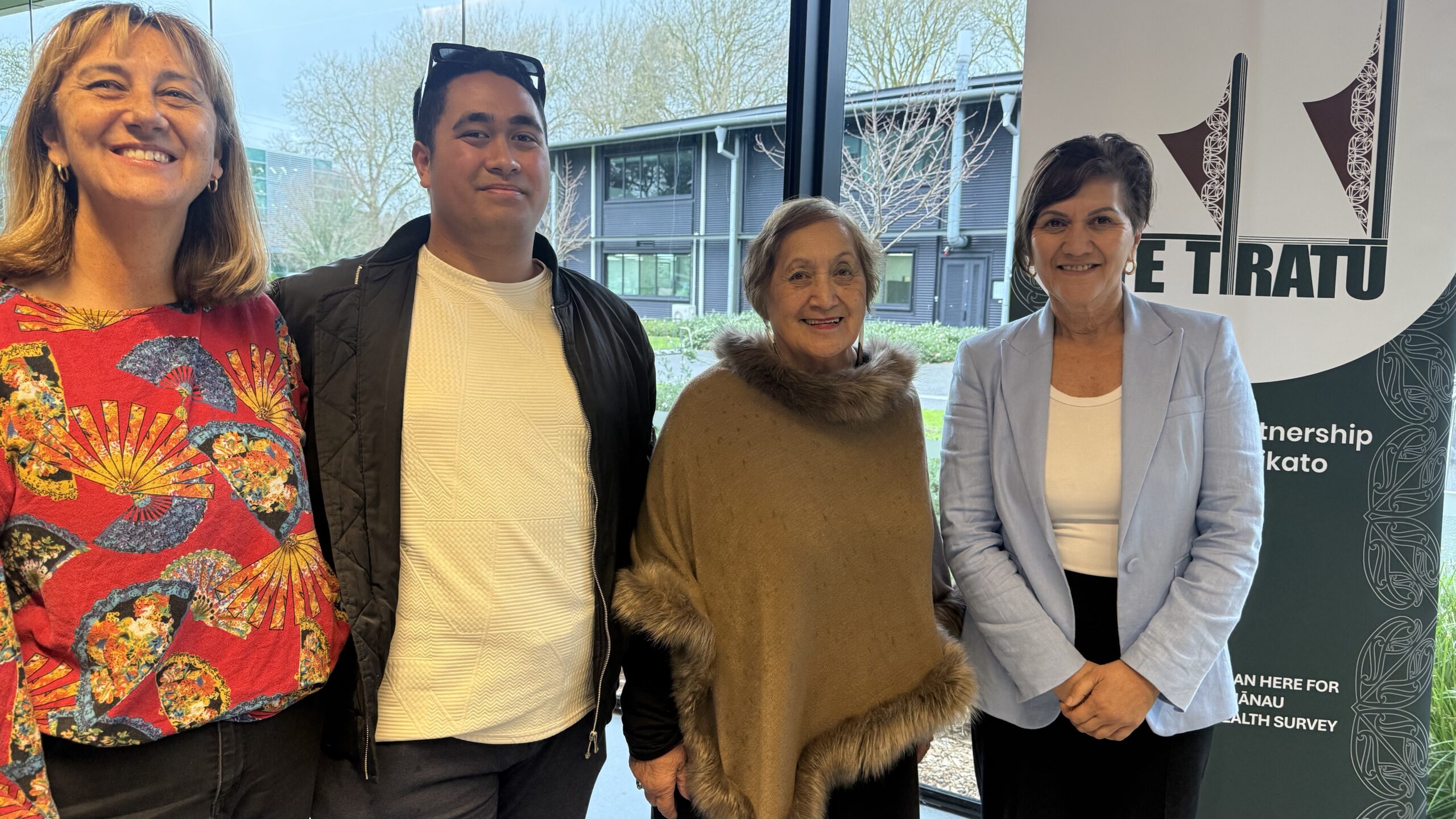
Photo: Te Tiratū Tumu Whakarae, Brandi Hudson (right) with Christine Arihia Brears (second right) and her kaimahi who travelled all the way from Taumarunui Kokiri Trust and Maniapoto Whanau Ora Centre to the Forum.
How do we truly shift the dial on health outcomes for whānau? For Te Tiratū Iwi Māori Partnership Board, the answer lies in listening to our providers, communities, whānau, aligning systems, and proving impact.
On Friday, over 30 kaimahi gathered at the Waikato Innovation Centre for Te Tiratū’s second Provider Forum, where Tumu Whakarae Brandi Hudson shared an update on kaupapa milestones before the rōpū moved into a wānanga on how data—can be a powerful tool for transformation, including a deeper kōrero on Social Return on Investment (SROI).
Two self-confessed, “old hands at this” Tammy Lehar and Susan Turner appreciated how space was created for partners who haven’t yet had the opportunity or experience, to come into a common kōrero together. “It’s something beautiful — if it’s done with the right intentions,” they said.
Tammy also highlighted the importance of building intentional data infrastructure “so we’re collectively working towards a shared vision—rather than duplicating efforts or collecting data in siloes.”
“We have the National Iwi Board Chairs Forum and the Iwi Māori Partnership Boards (IMPBs) with a common intention of strengthening data collection in this space. But to create meaningful connections between data and whānau outcomes, we must first build strong, integrated connections between these existing and emerging infrastructures—especially if we’re committed to a Whānau Ora approach.”
“This requires multiple, layered conversations. Personally, I’d challenge the assumption that Primary Health Organisations (PHOs) alone can provide a full picture, as they mainly reflect the primary health care lens. We also need to draw on data from other sectors, such as those funded under MSD and elsewhere, to understand the broader context of whānau wellbeing,” she said.
“There’s a foundational conversation needed—both at a local level and across the larger infrastructure. These discussions are already happening, but it takes time to bring the right people together in the right forum.” Innovation analyst Mari Tanioka from ImpactLab shared case studies on how to turn deep community knowledge into visible, trusted evidence.
“It’s a shift from knowing your mahi matters, to showing it clearly—using stories, numbers, and whānau voices. Often, what’s seen as anecdotal or informal is actually powerful insight. When made visible, it becomes a force for accountability and change,” she said.
Mari encouraged providers to start simple—by collecting clear, useful data such as how many whānau are being reached, or what barriers they face.
She gave the example of a provider who discovered, by tweaking just one survey question, that they were reaching over 63,000 tamariki—far more than they had previously realised. That kind of insight validates the mahi of kaimahi and helps funders better understand the scale and impact of their work.
The forum brought the philosophy of social investment into sharp focus. In a world of scarcity, complexity, and urgency, targeted support can change the course of a life. The difference between what a whānau’s future might look like without help—and what becomes possible with it—is what we call social value.
“Transforming lives through targeted interventions”— that, said Mari and her colleague Sarah Tuck, Engagement Manager at ImpactLab, is the heart of social investment.
Measuring that difference isn’t just about proving value—it’s about understanding what really works. Mari shared how one provider used SROI analysis to demonstrate that their slower, trust-based approach to health visits wasn’t inefficient—it was essential. With that evidence, they secured further funding.
Another organisation shifted strategy entirely, moving from diabetes treatment to prevention, after data showed how early engagement with whānau could help avert long-term harm.
For Te Tiratū, this mahi is about building strong, integrated systems that transform the system itself. Data alone is not the goal—it’s the pathway to transformation.
The shift from knowing to showing is more than a technical process. It takes time, care, and connection—but it’s what builds the momentum to reshape outcomes for our whānau, now and for generations to come.
Te Tiratū at the table of Rangitāmiro operating from Tūwharetoa to Te Tai Tokerau
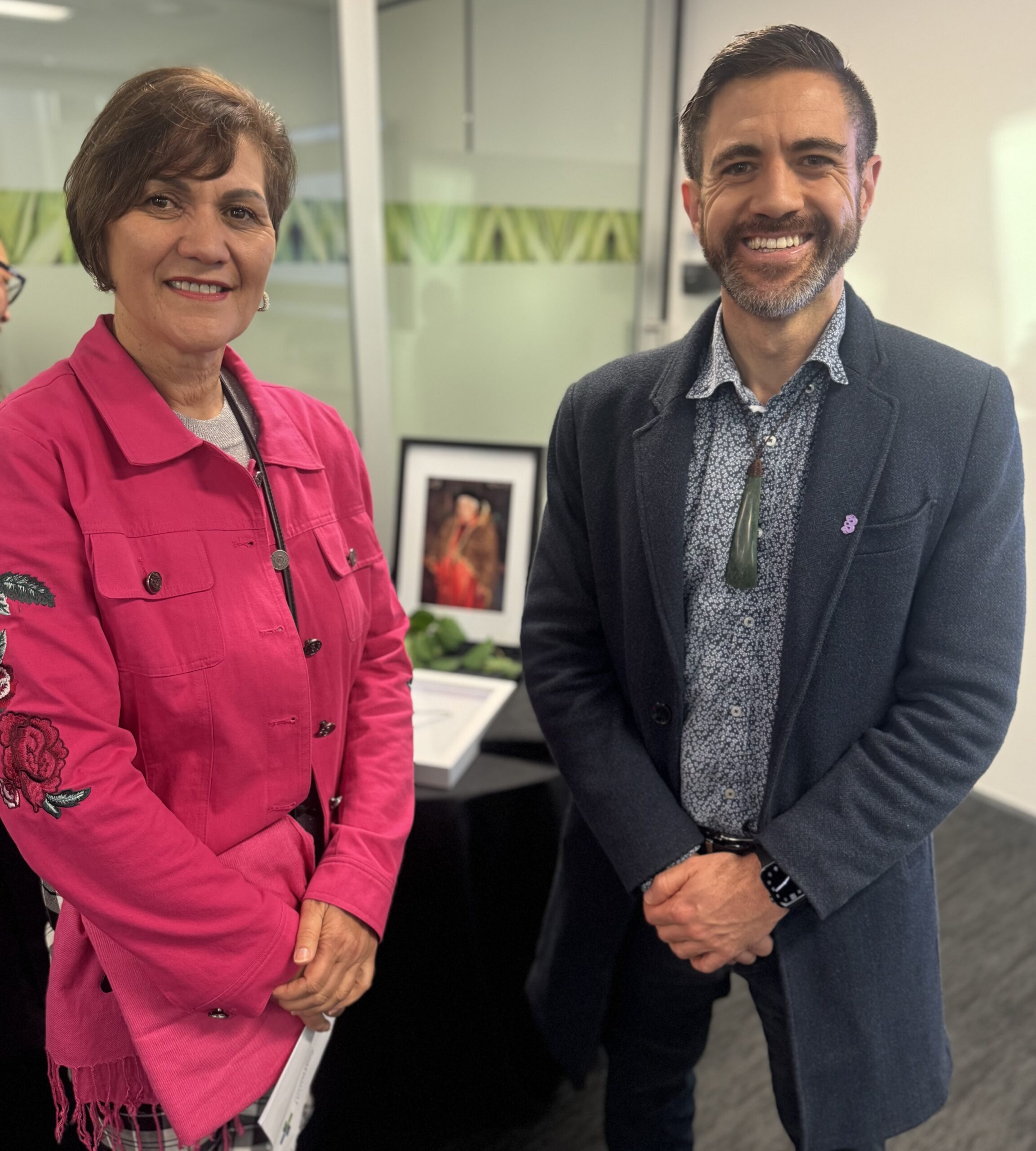
Photo: Te Tiratū Tumu Whakarae, Brandi Hudson with Te Tiratū and Rangitāmiro Board member, Dr Mataroria Lyndon
Rangitāmiro is now fully operational, prepared to serve whānau across the largest region of all four new Whānau Ora Commissioning Agencies — stretching from the Far North to Tūwharetoa. This readiness is no accident. It reflects months of deliberate and intensive engagement, with more than 300 hui held with whānau and providers throughout Te Tai Tokerau, Tāmaki Makaurau, Waikato, Hauraki, and Tūwharetoa.
These conversations have shaped our approach and ensured that those already receiving Whānau Ora support will experience continuity, not disruption, during this transition.
Among those helping to lead this kaupapa is Dr Mataroria Lyndon (Ngāti Hine, Ngāti Wai, Ngāti Whātua, and Waikato) — a board member of both Te Tiratū Iwi Māori Partnership Board and Rangitāmiro. With deep whakapapa ties across the region and a lifetime of service to whānau health and Māori-led systems change, Dr Lyndon is confident that Rangitāmiro will continue to uplift whānau across Aotearoa.
From today, 301 Whānau Ora Navigators are on the ground through Rangitāmiro providers — reaching 100% of Rangitāmiro’s contracted target with Te Puni Kōkiri. This includes a net increase of 120 new kaimahi to meet the deep need across our rohe. These roles are not just numbers — they are trusted relationships, born from community, delivering support that reflects the real lives and aspirations of our whānau.
The Rangitāmiro commissioning model has also evolved. More pūtea will reach communities, where it is most needed. A stronger data system will help Rangitāmiro see what’s working, for whom, and why — improving outcomes and accountability. Direct relationships with providers will ensure transparency, responsiveness, and impact.
What remains unchanged is the unwavering focus of Rangitāmiro: whānau.
Whānau wellbeing. Whānau dreams. Whānau tino rangatiratanga.
A new dawn for whānau ora: Te Tiratū at the launch of Rangitāmiro
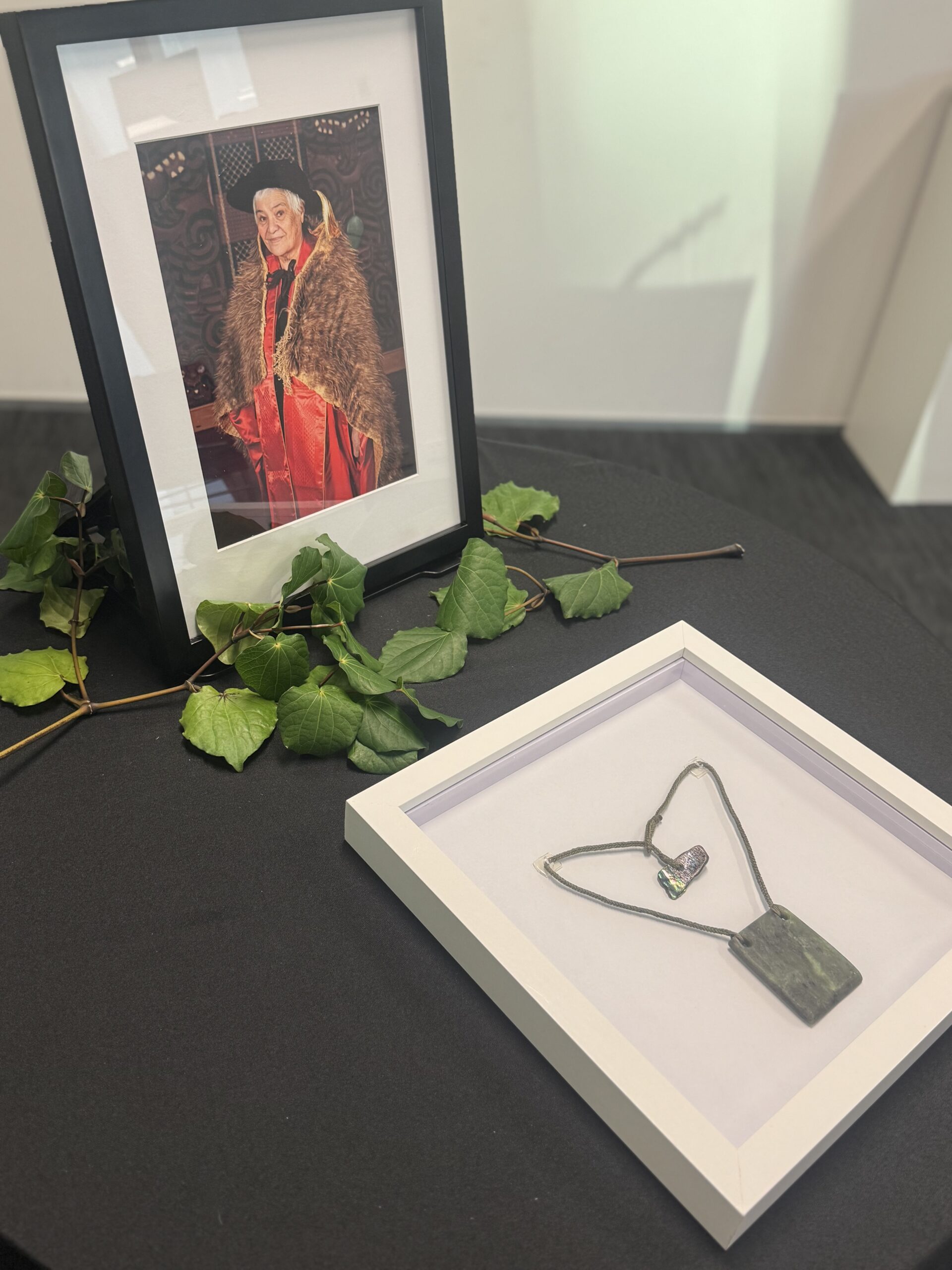
Photo: The late Kahurangi Tariana Turia and the mauri stone of Rangitāmiro
Early this morning, as the sun rose over Tāmaki, we gathered in karakia to mark the beginning of a powerful new chapter for Whānau Ora — Day One of Rangitāmiro, our new Whānau Ora Commissioning Agency for Te Tai Tokerau, Tāmaki Makaurau, Waikato, Hauraki and Tuwharetoa.
We carry forward the legacy of our beloved Kahurangi Dame Tariana Turia — with aroha, unity, and fierce determination. Her vision, rooted in manaakitanga, whanaungatanga, and tino rangatiratanga, continues to guide our mahi today. Whānau Ora is not just a policy; it’s a movement that centres whānau as the leaders and decision-makers of their own futures.
Rangitāmiro brings together the strength and vision of Te Tiratū Iwi Māori Partnership Board, Ngaa Pou Hauora oo Taamaki Makaurau, and the National Hauora Coalition (NHC). Together, we are focused on what matters most — the wellbeing and mana motuhake of our whānau.
Already operational, Rangitāmiro has contracted 301 kaimahi, including 120 new roles, to meet the growing needs of our region — from Tuwharetoa to the Far North. It holds the largest population of all four Commissioning Agencies and is committed to delivering services that support whānau across hauora, housing, kai security, oranga hinengaro, rongoā, financial wellbeing and more.
As a founding partner of Rangitāmiro, Te Tiratū stands proudly in our responsibility and honour to uphold Dame Tariana’s legacy. We were humbled to stand in karakia, to acknowledge our tūpuna, and to commit ourselves to this kaupapa once more — for our tamariki, our mokopuna, and all the generations to come.
“I mihi to all of the new commissioning agencies who put their hands up to continue this extraordinary mahi delivering Whānau Ora support. It’s evident that, despite it being our first day, it’s not our first experience with this kaupapa. We’ve been working with whānau for decades, and we’re resolute in taking those values, alongside the powerful legacy of Dame Tariana, forward into the future for our respective regions. Dame Tariana had always spoken of the importance of mahitahi, whanaungatanga, and manaakitanga for Whānau Ora,” Dr Mataroria Lyndon, Board member of both Te Tiratū Iwi Māori Partnership Board and Rangitāmiro.
Mā te huruhuru, ka rere te manu — with the right support, our people will soar.
Day one, same kaupapa: whānau ora thrives through Rangitāmiro
MEDIA STATEMENT
FOR IMMEDIATE RELEASE
Tuesday 1 July 2025, 6:00 AM
2 minutes to Read
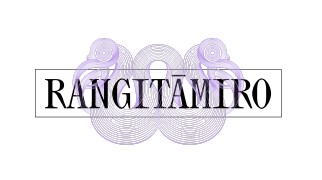
The legacy of Dame Tariana Turia will continue to thrive under the new Whānau Ora Commissioning Agency, Rangitāmiro, for Te Tai Tokerau, Tāmaki Makaurau, Waikato, Hauraki and Tuwharetoa from today.
Rangitāmiro is a consortium of Te Tiratū Iwi Māori Partnership Board, National Hauora Coalition (NHC), and Ngaa Pou Hauora oo Taamaki Makaurau (Ngaa Pou Hauora).
Rangitāmiro Board Chair Eru Lyndon acknowledged the substantial responsibility of continuing Whānau Ora.
“The late Dame Tariana Turia led the remarkable legacy of Whānau Ora that encompasses the crucial journey of growing whānau capacity capability and independence. Dame Tariana was steadfastly focused on empowering whānau to reclaim authority of their situation, to determine the solutions that impact them and the generations to come. Starting today and continuing, Rangitāmiro is committed to Dame Tariana’s vision with heightened concentration and unwavering dedication to whānau.”
Rangitāmiro has the largest population of the four new commissioning agencies and board member Dr Rachel Brown said they’re operational.
“We’re building on the success of Whānau Ora commissioning agencies and the great work
that’s been done. They’ve benefited whānau – they’ve benefited my own whānau. The project team have been working tirelessly over the past few months on the transitional process with existing and new partners. We have contracted 301 new full time employees, an increase of 120 kaimahi allowing us to reach even more whānau than before with minimal disruption to meet the deep need from Tuwharetoa to the Far North. These are staggering results in a very constrained timeframe that shows our dedication to the kaupapa and allegiance to Whānau Ora.”
Board member Dr Mataroria Lyndon, who is also a Board member of Te Tiratū brings a wealth of knowledge to the Rangitāmiro board and he is confident the new commissioning agencies will help improve whānau outcomes across Aotearoa.
“I mihi to all of the new commissioning agencies who put their hands up to continue this extraordinary mahi delivering Whānau Ora support. It’s evident that, despite it being our first day, it’s not our first experience with this kaupapa. We’ve been working with whānau for decades, and we’re resolute in taking those values, alongside the powerful legacy of Dame Tariana, forward into the future for our respective regions. Dame Tariana had always spoken of the importance of mahitahi, whanaungatanga, and manaakitanga for Whānau Ora.”
Te Tiratū releases first “confronting” monitoring report on health system
MEDIA STATEMENT
FOR IMMEDIATE RELEASE
Friday 27 June 2025, 6:00 PM
2 minutes to Read
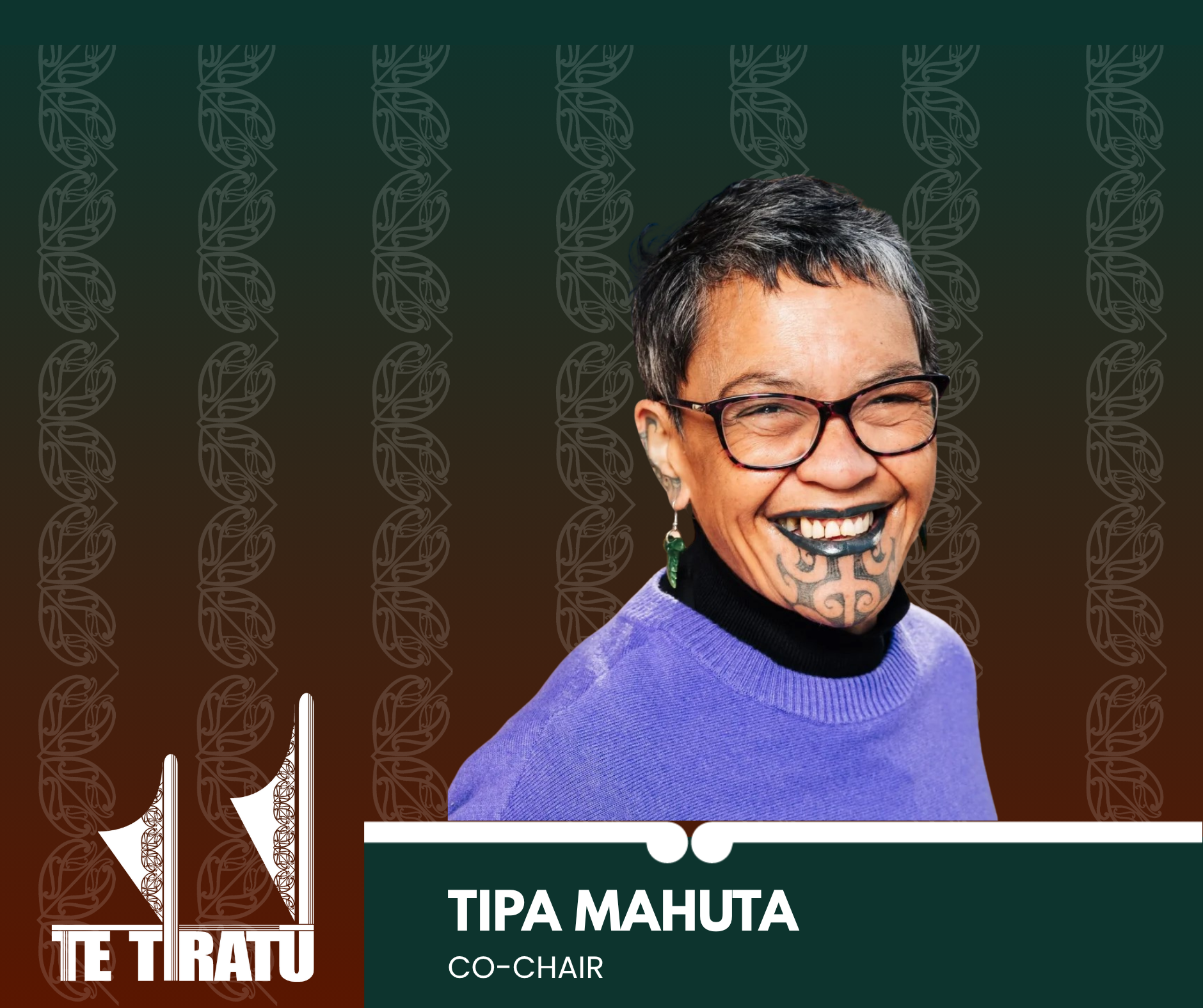
Te Tiratū Iwi Māori Partnership Board has released its inaugural Monitoring Report — a 46-page document under Section 30(1) of the Pae Ora Act 2022 that holds a mirror up to the system and asks two urgent questions: Is it working for us? And is it honouring Te Tiriti o Waitangi?
“This isn’t just data,” says Te Tiratū Co-Chair Tipa Mahuta. “It’s a reflection of what our whānau are actually living through every day — and it’s hurting them. The gap between policy promises and real-life outcomes is still too wide. Te Tiriti o Waitangi must be upheld in practice, it’s not a nice to do – it’s a must do.”
“Top of mind for our Board is the toll of cardiovascular, respiratory, and renal disease on our people which is simply devastating. Too many of our whānau are dying from preventable conditions — on average, seven years earlier than anyone else in the country.”
Representing 114,000 whānau across the Tainui waka rohe, Te Tiratū has drawn on lived experience from Whānau Voice surveying in the community, very limited data from Te Whatu Ora Health New Zealand, and legislative benchmarks to track system performance— and the findings are both sobering and clear – equity remains out of reach for too many Māori.
The report evaluates how well the system is delivering based on Te Tiratū’s regional health priorities, the five Government health targets, and Te Whatu Ora Health New Zealand’s statutory obligations under the Pae Ora (Healthy Futures) Act 2022.
It arrives at a pivotal time, as the Crown signals more major changes — including proposed amendments to Pae Ora after the disestablishment of Te Aka Whai Ora Māori Health Authority in its first 100 days.
“What we found in the report is confronting. Despite isolated gains — such as in mental health and addiction services — inequity remains entrenched. Our whānau continue to face multiple barriers to care, including cost, distance, culturally unsafe services, and long wait times,” said Mahuta.
Cancer screening rates for Māori remain far below national targets, and many Māori are missing out on essential primary care. Data is either missing or incomplete across key health areas like immunisation, oral health and long-term conditions — making it nearly impossible to track improvements or hold the system accountable.
The report also highlights that Te Whatu Ora Health New Zealand is falling short on many of its Pae Ora legislative obligations. Authentic iwi partnership in governance and decision-making is minimal or missing altogether.
Hauora Māori providers, while delivering high-trust, culturally grounded services, remain constrained by funding inequities and fragmented, siloed contracting systems.
Te Tiratū has sent the monitoring report to both Te Whatu Ora Health New Zealand and the Hauora Māori Advisory Committee and invited them to use the findings to shape advice to Minister Brown on investment, governance, and policy affecting Māori.
“We’ve seen what’s possible when whānau are listened to and resourced properly — particularly in areas like renewing the successful childhood immunisation programme run by Māori providers,” Mahuta said.
“Now we need to scale that success. We remain committed to advocating for a health system that is fair, accessible, and equitable — one that reflects the rights, needs and aspirations of our people.”
Concerns raised over proposed health legislation amendments
Photo: Te Tiratū Iwi Māori Partnership Board Co-chair Hagen Tautari
A collective of 15 Iwi Māori Partnership Boards (IMPBs), including Te Tiratū Iwi Māori Partnership Board, has voiced strong concerns that upcoming amendments to the Pae Ora (Healthy Futures) Act may dilute local Māori influence and centralise health decision‑making in Wellington
Health Minister Simeon Brown’s proposed changes would reshape IMPBs from local decision-makers into advisory bodies, shifting their role to providing input via the Hauora Māori Advisory Committee (HMAC) rather than engaging directly in service design.
Hagen Tautari, Co‑Chair of Te Tīratu IMPB (Waikato region), warns that removing IMPBs’ autonomy threatens the authentic voice of whānau and undermines hard-won local gains. While welcoming the Minister’s commitment to equitable and timely healthcare, Tautari stresses that progress for Māori health is rooted in partnership and community-led design under Te Tiriti — not top-down governance.
The IMPBs have formally submitted their concerns in a letter to the Minister, emphasising that any reform must align with Treaty obligations by maintaining local influence, community engagement, and regional mana to achieve genuine equitable outcomes.
Rural Māori at risk: Unsafe hospital job share called out
MEDIA STATEMENT
FOR IMMEDIATE RELEASE
Thursday 26 June 2025, 3:00 PM
2 minutes to Read
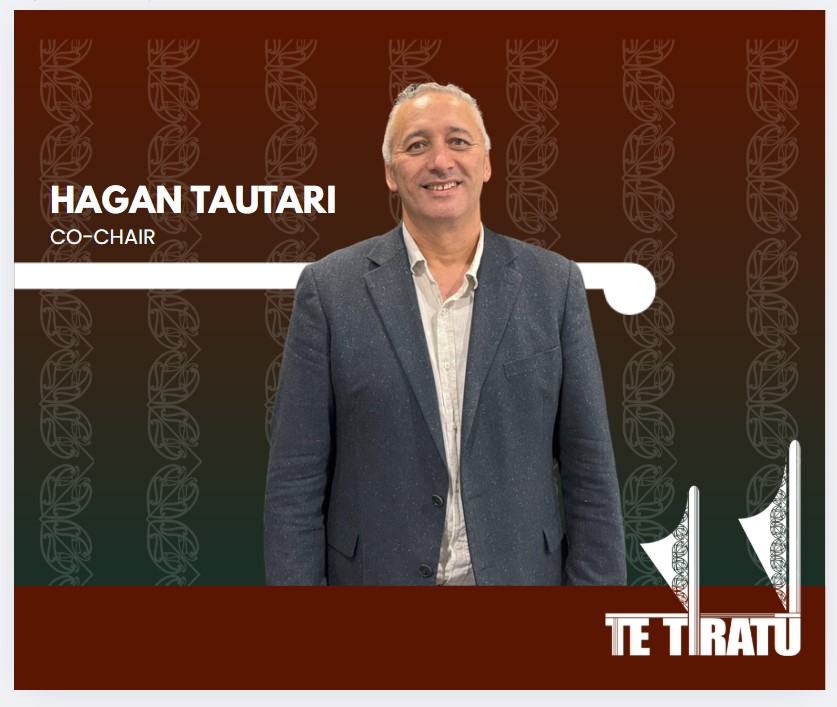
Te Tiratū Iwi Māori Partnership Board representing 114,000 whānau in Tainui waka rohe is calling for a full review of an integrated cleaner-security staffing model in two rural Waikato hospitals which serve communities with high Māori populations.
The Board was alerted by media reports about Te Whatu Ora Health New Zealand’s decision, which raised serious concerns regarding patient and staff safety, as well as the practicality of merging the roles.
Implemented at Te Kuiti and Tokoroa hospitals, the model combines the roles of hospital cleaner and security officer — a move that has been called “a life-or-death matter”.[1] These hospitals that sit within Te Tiratū Iwi Māori Partnership Board’s rohe are directly relevant to its work to ensure that Māori have a real say in local health design, delivery, and decision-making.
“Rural Māori communities should not be treated as testing grounds for potentially unsafe and ill-conceived workforce experiments. It is time for Te Whatu Ora Health New Zealand to put the safety and dignity of our people first and uphold the principles of Te Tiriti o Waitangi,” said Hagen Tautari, co-chair of Te Tiratū Iwi Māori Partnership Board.
It reflects a wider systemic failure to uphold Te Tiriti o Waitangi and engage iwi as genuine partners in health governance. At its heart it’s about how the Crown treats mana whenua in the decisions that directly impact whānau – and how it involves the Treaty partner at a locality as an equal.
A recent Te Whatu Ora Health New Zealand review confirms that while cleaning duties were being carried out, security coverage was inadequate and staff felt unsafe, particularly during overnight shifts where only two nurses and one cleaner-security officer are present.
“This staffing model fails our people, healthcare professionals and hapori. It undermines basic safety, disrespects the skill of both roles, and ignores the lived realities of rural hospitals — where Māori make up a significant proportion of patients and staff,” Tautari added.
Key concerns highlighted by Te Tiratū Iwi Māori Partnership Board include:
- Safety is non-negotiable. It is a matter of time before preventable harm occurs. Staff cannot be in two places at once during critical incident and expecting them to compromise both patient and worker safety.
- It’s a false economy. The model was meant to save over $200,000 in its first year. It only saved $137,000 — a shortfall that cannot justify the identified safety risk and workforce dissatisfaction.
- Rural Māori carry the burden. This model would not be trialled in larger urban hospitals. That it has been tested in predominantly Māori rural communities is a breach of equity and justice.
- Lack of consultation with Treaty partner. Health NZ must uphold its Te Tiriti obligations to work in partnership with Māori – which is not optional, symbolic, or after-the-fact.
Te Tiratū Iwi Māori Partnership Board is now calling on Te Whatu Ora Health New Zealand to commit to a community-informed review that centres safety, wellbeing, and equity, invest in separate, skilled roles for security and cleaning that are fit for purpose and protect whānau, support staff and nurses in rural hospitals through properly resourced, safe, and sustainable models of care.
[1] https://www.rnz.co.nz/news/national/564931/hospital-staff-concerned-about-combined-cleaner-security-officer-roles
Iwi Māori Partnership Boards share concerns over new health reforms
Photo: Te Tiratū Iwi Māori Partnership Board Co-chair Hagen Tautari
Te Tiratū Iwi Māori Partnership Board (IMPB) has voiced concern over the government’s proposed changes to the Pae Ora (Healthy Futures) Act 2022, which would reduce the board’s decision-making authority to a purely consultative role.
Co-chair Hagen Tautari says this move weakens the intent of Pae Ora and undermines the Crown’s obligations under Te Tiriti o Waitangi. “Te Tiriti is a constitutional foundation. Partnership must be upheld in law and practice—not just policy,” he said.
While critical of the proposed reforms, IMPB supports Minister Simeon Brown’s focus on patient-centred care and timely, quality health services. In a formal response, IMPB offered constructive solutions and reaffirmed support for better national oversight—so long as reforms are properly resourced and protect the community-based leadership role of IMPBs.
Tautari warns against centralising decision-making in Wellington, which could reverse hard-won gains in Māori health equity. “The voices of whānau are strongest at the local level—where services are delivered and gaps identified. True equity means enabling local solutions,” he said.
Partnership, not centralisation in Pae Ora health reforms
MEDIA STATEMENT
FOR IMMEDIATE RELEASE
Tuesday 24 June 2025, 10:00 AM
2 minutes to Read

Te Tiratū Iwi Māori Partnership Board is concerned over proposed legislative reforms to the Pae Ora (Healthy Futures) Act 2022 that removes the current direct role of Iwi Māori Partnership Boards (IMPBs) in shaping the local health service design and delivery.
Stripping IMPBs of their decision-making authority and reducing our role to that of a ‘consultative’ body risks undermining the spirit and intent of Pae Ora, weakening community-led health leadership, and falls well short of the Crown’s obligations under Te Tiriti o Waitangi,” said Hagen Tautari, co-chair of Te Tiratū Iwi Māori Partnership Board.
“Te Tiriti is a constitutional foundation. Reforms must reflect the Crown’s enduring duty to uphold Te Tiriti obligations in both law and practice, not through policy alone.”
The sentiment is also shared by the larger Te Manawa Taki IMPB collective that comprises of Te Tiratū, Tairāwhiti Toitū Te Ora, Te Moana a Toi, Te Taura Ora o Waiariki, Tūwharetoa, and Te Pūnanga Ora.
The rōpū has called for the legislative changes to enter a formal co-design phase with Iwi Māori Partnership Boards and asked the Minister for urgent clarification on:
- How IMPBs’ Community Health Plans will influence service outcomes under the new framework
- What mechanisms will ensure IMPBs retain their role in local service design
- How the Crown will ensure accountability and transparency without undermining Tiriti-led governance
While Te Tiratū supports the Minister’s back-to-basics approach putting patients first and stated goal of timely, quality healthcare for all New Zealanders, Tautari says the proposals risk centralising decision-making in Wellington which would erode decades of hard-won progress trying to improve health outcomes for highest-need group in New Zealand’s health system.[1]
A letter to the Minister has been penned and endorsed by the Te Manawa Taki IMPB collective providing constructive feedback and solutions. It supports reforms that strengthen national oversight and equity outcomes – including the proposed expansion of the Hauora Māori Advisory Committee (HMAC) – but only if they are adequately resourced and do not displace the unique, community-based role of IMPBs.
“Partnership is not a principle to be referenced in policy—it is a constitutional obligation that must be upheld in law and practice,” said Tautari. “The voices of our whānau are strongest at the local level, where services are delivered, where the gaps are being identified by Whānau Voice and where IMPBs are making a real difference.”
The Board points to recent success in Te Moana a Toi, a member of te Manawa Taki IMPB collective where the regional IMPB worked alongside Whakatāne Hospital to address critical maternity service issues, delivering faster solutions than waiting on national intervention.
“Equity comes from working alongside whānau, listening to communities, and enabling local solutions. The reforms must protect that,” Tautari said. Reiterating the Board’s commitment to working constructively with the Government to ensure the health system delivers better, more equitable outcomes for Māori and all New Zealanders.
[1] Pg23-24 https://forms.justice.govt.nz/search/Documents/WT/wt_DOC_195476216/Hauora%202023%20W.pdf
Te Tiratū on 1News: Pae Ora amendments spark national conversation
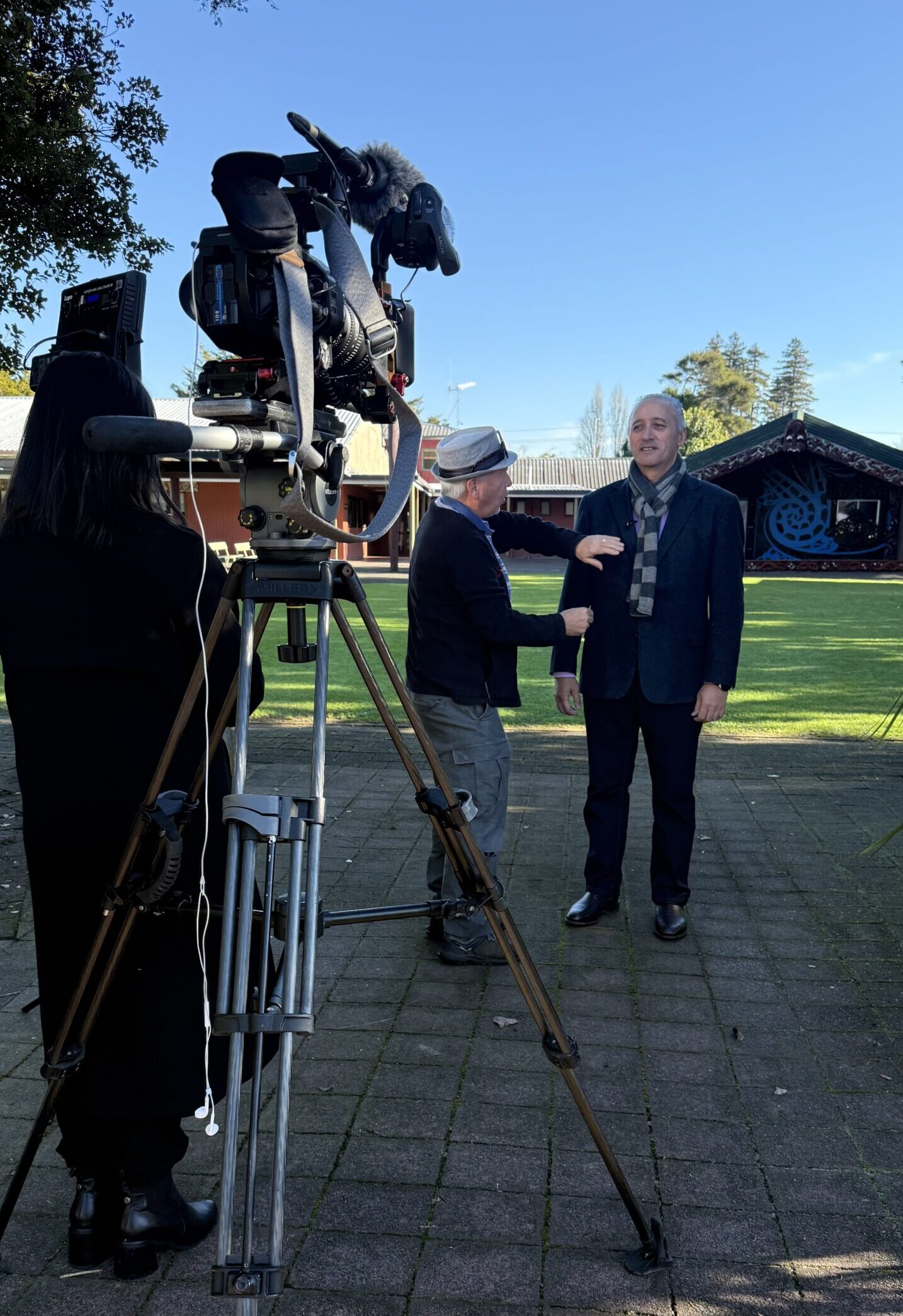
Our co-chair Hagen Tautari getting ready to be interviewed by 1News at Kirikiriroa Marae
Our co-chair Hagen Tautari featured on 1News this week, representing the voice of Te Tiratū and our wider iwi Māori communities, as the government proposes changes to the Pae Ora (Healthy Futures) Act.
There are 15 Iwi Māori Partnership Boards (IMPBs) across the motu, each tasked with identifying the health needs of Māori in their region and advising Health New Zealand (Te Whatu Ora) on how to address those needs.
“We’ve been legislated to provide a voice of whānau,” said Hagen Tautari. “That’s why we’re so important.”
Under the previous health minister, IMPBs were also set to receive decision-making powers. However, the current Minister of Health has signalled a different direction.
“Health New Zealand gets a huge amount of money each year from the government, and we expect them to deliver for patients,” the Minister said.
In response, Hagen made it clear that iwi Māori want more than a seat at the table.
“I think everybody would want to be more than just an advisory group,” he told 1News.
While Te Tiratū supports the Minister’s back-to-basics approach of putting patients first, and the stated goal of timely, quality healthcare for all New Zealanders, Tautari says the proposals risk centralising decision-making in Wellington — undermining decades of hard-won progress to improve outcomes for the highest-need group in Aotearoa’s health system.
Questions remain about how equity will be upheld. Te Tiratū stands firm in our role — ensuring Māori voices are heard and upheld at every level of health system decision-making.
